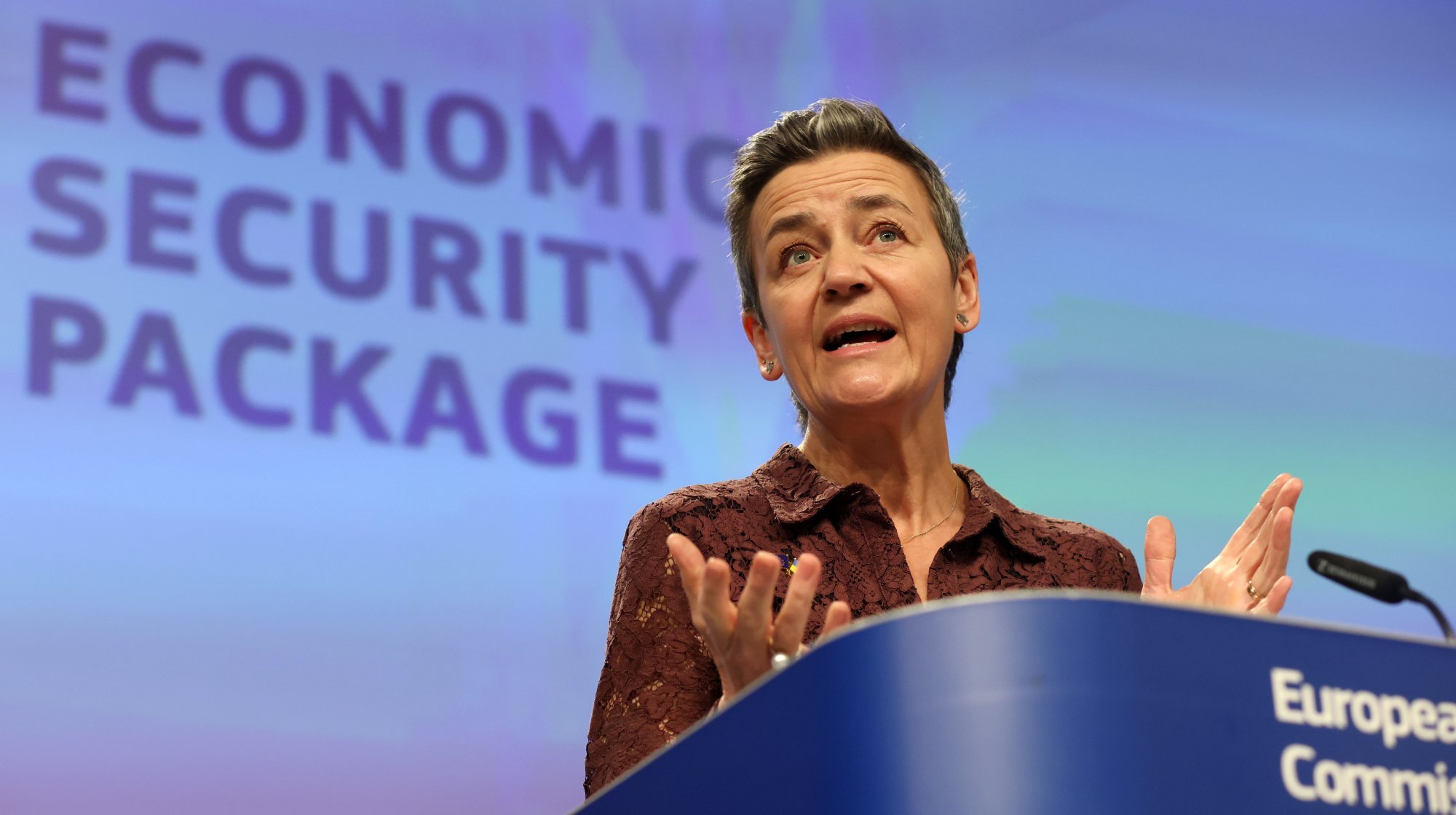“In 2022 investigative journalists found almost 3,000 scientific collaborations of EU universities with Chinese military institutes since the year 2000,” EU competition boss Margrethe Vestager told a press conference.
“This may not have been illegal then. But the question, of course, is: is it desirable? Is this what we want?”
The most controversial elements of the strategy, first proposed last June, have faced opposition from EU member states.
Instead of proposing a law for screening the investments of private instead companies into 10 hi-tech sectors in perceived risky markets like China, Brussels will embark on a series of monitoring exercises, aiming to propose a policy by the end of next year. In reality, it could be many years before any proposal becomes law.
“I would not agree that the package is watered down,” EU trade chief Valdis Dombrovskis told reporters. “All the initiatives we announced in June, we are following through in consultation with member states and stakeholders.”
Brussels has also been pushing to harmonise member states’ export control regimes. A senior EU official, speaking on condition of anonymity, said this was to reduce the risk that “through certain investments, in certain countries, the technology could leak, know-how is passed on and gets into the hands of military intelligence and is used back against us”.
Since Commission President Ursula von der Leyen announced plans to de-risk ties with China last March, with outbound investment screening at its core, the commission has become embroiled in a tussle with powerful member states such as France and Germany.
The stand-off highlights concerns about the conflation of national and economic security, in an age when it is getting harder to distinguish between products with civil and military purposes.
As a result, the Commission, which sets trade policy for the bloc, wants to expand its responsibilities to address these concerns – much to capitals’ chagrin.
It may also face an uphill struggle to get member states to centralise European export control authority.
Vestager said that the commission was trying to avoid a “turf war” with its members.
“We could have a turf war, we could just suggest that competency moves and then we would have I think a very conflictual discussion about competencies,” she said.
“I hope that it is clear that by this sort of step-by-step approach, we are doing what we can in order to work with member states without asking for competences to be moved.”
While China has not been named in the discussion on export controls, Brussels sources privately admit they want to stop European technology such as quantum computing and artificial intelligence from strengthening the People’s Liberation Army.
The EU and China can’t agree on key issues. Is this ‘a recipe for a trade war’?
The EU and China can’t agree on key issues. Is this ‘a recipe for a trade war’?
The idea is that a Europeanised export controls regime would eventually work in tandem with outbound investment screening to make sure that restrictions on exports to certain countries are not undercut by factories being built or companies bought there.
The commission has suggested “introducing uniform EU controls on new items that were not adopted by the multilateral export control regimes because they were blocked by certain countries, notably Russia”.
The current system “creates loopholes that we cannot afford to have”, trade chief Valdis Dombrovskis told reporters. “We also see a multiplication of new national controls on emerging and sensitive technologies imposed by some countries.”
There is also a determination to break free of the United States’ extraterritorial use of export controls.

The only legislative proposal in the new package is a tightening of existing screening of investments into the EU, which would require all members to vet foreign takeovers to ensure they align with its security interests.
The bloc already has a foreign direct investment screening mechanism, which has been adopted by all but five of its members and was introduced largely in response to Beijing’s hoovering up of strategic European tech companies.
But Brussels fears that until it is harmonised, companies in key industries such as robotics, biotech or aerospace could fall into the hands of Chinese or other authoritarian powers.
Under the new proposals, the Commission will focus on “risky transactions” in sectors with military connections or in the 10 critical technologies the bloc named last year. It would also extend the screening to include intra-EU deals where the buyer is not European.
EU envoy slams China’s ‘national security obsession’, questions growth rebound
EU envoy slams China’s ‘national security obsession’, questions growth rebound
The commission’s statistics show that 32 per cent of all investments scrutinised in 2022 under existing mechanisms were American. Just 5.4 per cent were Chinese.
Despite this, concern over Chinese ownership of strategic European infrastructure has risen. Last week, the European Parliament passed a non-binding resolution demanding that European critical assets, such as ports and transport networks, undergo mandatory screening to exclude “suspicious investments from China”.


